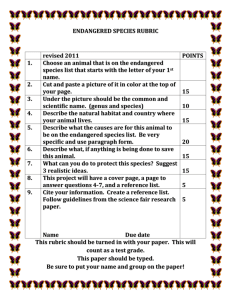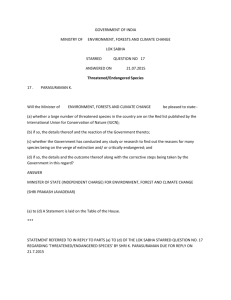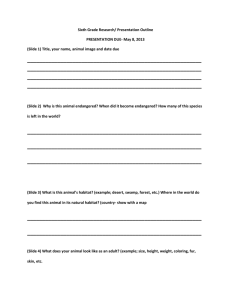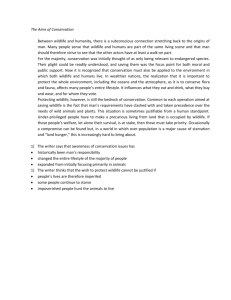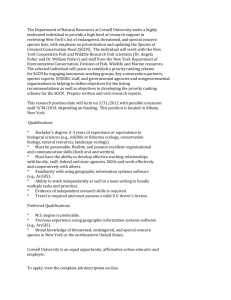Endangered Wildlife Monitoring - Other Destination or Service Rate
advertisement
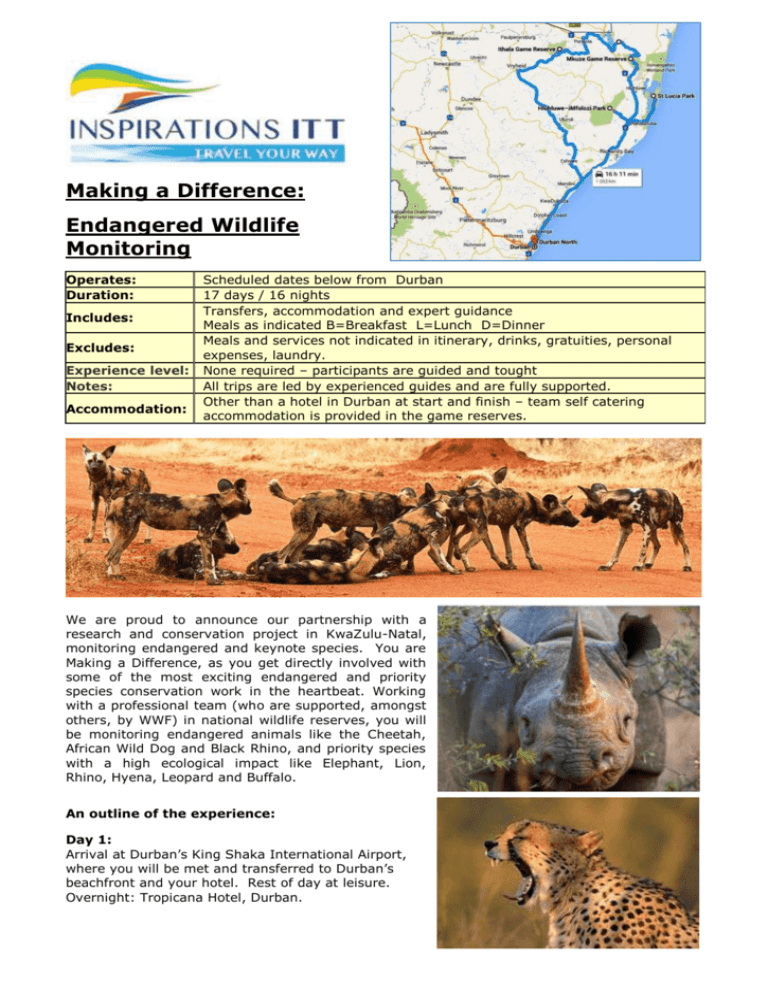
Making a Difference: Endangered Wildlife Monitoring Operates: Duration: Includes: Excludes: Experience level: Notes: Accommodation: Scheduled dates below from Durban 17 days / 16 nights Transfers, accommodation and expert guidance Meals as indicated B=Breakfast L=Lunch D=Dinner Meals and services not indicated in itinerary, drinks, gratuities, personal expenses, laundry. None required – participants are guided and tought All trips are led by experienced guides and are fully supported. Other than a hotel in Durban at start and finish – team self catering accommodation is provided in the game reserves. We are proud to announce our partnership with a research and conservation project in KwaZulu-Natal, monitoring endangered and keynote species. You are Making a Difference, as you get directly involved with some of the most exciting endangered and priority species conservation work in the heartbeat. Working with a professional team (who are supported, amongst others, by WWF) in national wildlife reserves, you will be monitoring endangered animals like the Cheetah, African Wild Dog and Black Rhino, and priority species with a high ecological impact like Elephant, Lion, Rhino, Hyena, Leopard and Buffalo. An outline of the experience: Day 1: Arrival at Durban’s King Shaka International Airport, where you will be met and transferred to Durban’s beachfront and your hotel. Rest of day at leisure. Overnight: Tropicana Hotel, Durban. Day 2: You will be transferred from Durban, to the meeting point for your Endangered Wildlife Monitoring experience – refer information below. (BLD) Day 3 – 15: At the Endangered Wildlife Monitoring project busy with a variety of conservation and monitoring work involving endangered wild animals.(BLD) Day 16: Your last day at the Endangered Wildlife Monitoring camp. If you would like a longer Wildlife Monitoring experience, this must be arranged prior to your arrival and your itinerary will be adjusted accordingly. You will be collected and transferred back to Durban, Where your hotel is at Durban’s popular Gateway entertainment and shopping complex. After two weeks in the ‘bush’ you will probably enjoy being able to enjoy the restaurants and shopping which are across the road from your hotel. Overnight: City Lodge, Umhlanga Ridge. (B) Day 17: Your last day in Durban. You will be transferred to Durban’s King Shaka International Airport for your departure flight. (B) WHERE WILL I WORK? The Zululand ecosystem is among the most diverse and productive wild lands in the world, yet amid its gallery of wildlife, conservation efforts face tremendous challenges. Some of these challenges include: rapid encroachment and fragmentation of natural habitat; poaching; insufficient research and inadequate funding for monitoring and research; coupled with the occurrence of many endangered species. Zululand makes a dramatic backdrop to this initiative. It is a place of unspoilt beauty with cultures as diverse as its landscapes. Zululand is a rare place where age-old cultures and traditions live hand-in-hand with modern culture, living and conservation efforts. This takes place across 5 very different safari reserves in Zululand. Depending on your start date, and the duration of your participation, you may work at any, numerous or all of the safari parks. Each reserve is different in that the vegetation varies and different species of animal occur on each. The opportunity to work on multiple reserves depends on the length of your stay. If you stay for the minimum (2 weeks), you will work on only one reserve, but for every additional two weeks you take, the better your chance of experiencing another wildlife reserve. WHAT WILL I DO? You will assist the wildlife monitor in all day-to-day aspects of monitoring, including (where necessary): Daily tracking and locating of priority species wildlife in the wild, from an open 4x4 vehicle, via radio telemetry. Mapping the sightings using GPS equipment. You will be taught how to use the equipment. Observing animal behaviour (e.g. wild dog pack dynamics) for research purposes. Photographing and creating identity kits (for recently reintroduced/relocated animals). Periodically setting up camera traps at watering holes and game trails. Assisting with ongoing game counts if needed. Depending on how long you join our team for and the time of year you visit, you could be fortunate enough to participate in one of the following activities, which occur strictly as and when the need arises: Radio collaring of animals. Notching (identity marking) of animals such as Rhino. Night tracking excursions – for example Hyaenas. Animal Call-Ups (for example Lion) Relocation or re-introduction of endangered species. Vulture counts and nest surveys. Bird ringing & alien plant control. We cannot guarantee what activities will be happening over the time you are here; you will help out in these cases where the Reserve Management staff identify a particular need. As mentioned, the primary function of our teams is to provide the vital monitoring service for these reserves, and that does take up the majority of our time, as tracking the animals can be a timeconsuming task! Each Reserve has a different focus in terms of the work being done. While the project does plan and follow basic schedules, the nature of the work being done dictates that the animals and their environment are our number-one priority, and therefore our schedules may at times have to be altered due to unforeseen circumstances or incidents within this wild and dynamic environment. A TYPICAL DAY Volunteers leave camp at dawn (just before sunrise), seated on bench-seats on the back of the open 4x4 tracking vehicle. The team will locate the endangered species animals that the wildlife monitor has earmarked for the morning, using radio telemetry equipment that receives radio signal from the collars which are fitted onto the priority species animals. Once the team has successfully sighted the animals, you will observe them for as long as necessary, record the data and then move on the next animal/species on the daily monitoring schedule. Each day you will have free time during the midday period when it is hot and most animals are inactive (resting in the shade). During these few hours over the midday period you are welcome to read, sleep, eat, play cards or board games, or simply enjoy the animal and bird activity within and around your accommodation. If you would like to contribute in some way to the maintenance of the accommodation camp itself you are most welcome to do so – please let us know if you are “handy” with tools and would like the opportunity to contribute in this way, and we will alert your monitor to the fact that he/she may have some help thanks to you! You head out again on the vehicle between 2-3pm to follow up on those animals which were not located in the morning. You should be back in camp shortly after sunset, to start preparing supper and sit around the fire listening to the sounds of the bush and discussing the day’s events. Usually you will be in bed early, but on some nights volunteers may go out to track species like Hyaena, which are active at night. At least once a week, you will have a day set aside for administrative work (data capture and analysis). This is a vital part of the monitoring process, as this valuable information, which we gather, has numerous management applications, including the planning of successful introduction and removal strategies of priority wildlife species, as well as supplying information to the local conservation authorities. WHO CAN JOIN THE TEAM? Anyone from the ages of 18 to 70+ is welcome to join; there is usually a wide mixture of ages within the participants joining us, and we do our best to place participants of similar ages together where possible, as we find that this best facilitates group cohesion. All you need is a basic grasp of the English language, an enthusiastic attitude and open mind, and the passion to make a difference. All training and supervision will be provided, so no prior qualifications, skills or previous experience are required. We only accept a maximum of 5 volunteers at any given time on each of the reserves on which we work. We find this keeps the team small and efficient providing you with insights into real conservation work. WHERE WILL I BE LIVING? Each camp is situated within the reserves on which we work. The accommodation is basic but comfortable, with electricity, running warm water and flushing toilet. (Please note that, this being Africa, electricity and water supplies can at times be unreliable!) A bed, mattress, pillows and bedding are provided, but please bring your own towels. The accommodation is provided in twin rooms so you are likely to have to share room with another participant during your stay. There is a separate shared toilet/shower and kitchen, an outside seating and dining area, as well as a barbecue area where you can sit by the fire under the stars. (With the absence of artificial light, stargazing at the reserves is phenomenal!) Some camps are partly fenced but some are not, so you can expect visits from Baboons, Monkeys, Antelope, Bushbabies, Elephant and Hyena on occasion. For this reason please remember it is very important to always use torches when moving around the accommodation at night, and to NEVER leave the immediate camp area on foot when it is dark! It is also important to note that no-one is allowed to walk around within the reserves on their own (for example leave the accommodation camp for a walk) unless you are accompanied by a ranger who is qualified to deal with dangerous game on foot. The camp has a communal kitchen where everybody joins in to prepare their meals. Everything you need is provided including an oven, stovetop, microwave, solar cooker, and of course a fire, to cook on. Most of the time participants take turns preparing meals, or one person becomes the "chef" and the others help with chopping, peeling and cleaning. Basic food items are provided for within our food budget, enough for 3 healthy meals a day, including fruit. As far as possible, the project tries to be environmentally friendly, for example we do not buy tinned tuna, and we try to use game venison instead of commercially produced beef where possible. We do provide for vegetarians; please make us aware of your needs before you arrive. Drinking water at the accommodation is of a good quality, but you are welcome to purchase bottled water at your own expense. Each visitor will also be responsible for helping with general camp cleanliness and maintenance. This is a very important part of bush life, as an untidy / dirty room or kitchen is an invitation for all sorts of creatures to invade it. Some camps have washing machines to wash clothes, but if not, a tub with laundry detergent is provided for hand-washing your clothes. WHEN CAN I JOIN? 2015 04 or 18 January 01 or 15 February 01, 15 or 29 March 12 or 26 April 10 or 24 May 07 or 21 June 05 or 19 July 02, 16 or 30 August 13 or 27 September 11 or 25 October 08 or 22 November 06 December Rates are subject to Change and Exchange Fluctuations Making a Difference: Endangered Wildlife Monitoring 1 Oct – 31 Dec 14 1 Jan – 31 Oct 15 Cost per additional 2 weeks (Updated 07 Jan 2015) 17 days / 16 nights Currency Per Adult Sharing from / to Durban from / to Durban from / to Durban ZAR ZAR ZAR 20 090 21 470 11 700 Inspirations Travel & Tours Email: info@inspirations-travel.co.za l Tel: +27(0)31 266 0030 | Fax: +27(0) 31 266 0255 Inbound: www.africaninspirations.co.za l Outbound: www.inspirations-travel.co.za 9 Kensington Drive, Westville, 3629 l PO Box 1166, Westville, Durban, 3629, South Africa



